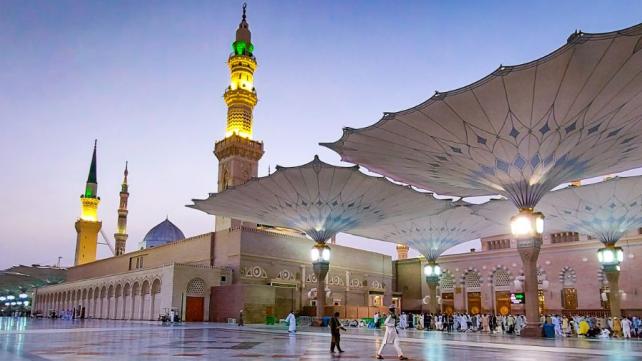
The Mawlid Al-Nabi marks the birthday of the Prophet Muhammad, peace be upon him, and is an annual holiday celebrated by Muslims around the world. This holiday, however, is controversial and scholars argue on the permissibility of it. Some Muslims, myself included, do not celebrate this holiday, not necessarily because of scholars’ opinions but rather out of ignorance on the topic. Because of this, I decided to research the origins of the Mawlid Al-Nabi celebrations and how it is celebrated in present times to understand this holiday. Note that I am not a scholar and the purpose of this article is not to debate on whether or not the holiday is permissible but rather to learn about the history and traditions of this day.
The precise date of the Prophet Muhammad’s (PBUH) birthday is debated, though the 12th of Rabi'’ al-Awwal is the widely accepted date. There are other candidates for the possible birthdate, such as the 2nd, 8th, and 10th, which all come from historical sources. The concrete evidence for the birthday of the Prophet (PBUH) lies in a hadith narrated by Ibn Qatadah, in which he says: The Messenger of Allah (PBUH) was asked about fasting on Mondays. He said, "That is the day on which I was born and the day on which I received Revelation." (Riyad as-Salihin 1255) The earliest biographer of the Prophet (PBUH), Ibn Ishaq, says that the precise birthday of the Prophet was Monday, 12th of Rabi' al-Awwal in the Year of the Elephant (for context, the Year of the Elephant is the year that Abraha, the ruler of Yemen, attempted to destroy the Kaa’ba with an army of Elephants. This story is mentioned in Surah 105). Other notable historians, such as Ibn Sa’d and Ibn Kathir, explain the other candidates for the exact date. Ibn Sa’d, in his Ṭabaqāt, mentions the 8th and 10th of Rabi' al-Awwal as candidates and mentions the Year of the Elephant as the year. Ibn Kathir acknowledges Ibn Ishaq’s claim, saying that it is the widely accepted date, but mentions that Ibn Ishaq does not have a source for it in his work. Ibn Kathir also mentions other claims by other scholars, including the 2nd, 8th, 10th, 12th, 17th, and 22nd of Rabi' al-Awwal. Conclusively, the precise date of the birthday of the Prophet (PBUH) is disputed by historical sources, but the 12th of Rabi' al-Awwal is most commonly accepted as the precise date, as Ibn Ishaq is the earliest source for the topic. Allah (SWT) knows best.
The Prophet Muhammad (PBUH) did not tell his companions to celebrate his birthday. The Mawlid Al-Nabi was founded a few hundred years after his death by the Fatimid Dynasty, who were rivals to the Abbasid Dynasty and ruled Egypt from 969 to 1171 CE. Al-Maqrīzi, a medieval historian from Egypt, quotes Jamāl al-Dīn Ibn al-Ma’mūn, who’s father was the Grand Vizier for the Fatimid Caliph Al-Amir in his book: Mawā’īẓ al-i’tibār fī khiṭaṭ Miṣr wa-l-amṣār, and reveals that the annual celebration of the Mawlid Al-Nabi was initiated in the 12th century, specifically in 517 AH (1123-1124). The Fatimid Dynasty claimed to be direct descendants from the Prophet, but followed Islam in a way that was considered to be outside of the religion by both Sunni and Shia Muslims (although they were Ismaili Shi’as). The Fatimids also established countless other annual holidays, such as the birthdays of Ali, Al-Hasan, and Al-Husayn, to name a few. They also supported pagan holidays as well. On these holidays, the Fatimids would distribute gifts to the people. The establishment of the Mawlid Al-Nabi, along with the other holidays, and the tradition to give gifts to the people was an attempt by the Fatimid Dynasty to gain approval as the rivals to the Abbasids. However, these birthday celebrations were forgotten after the Fatimid Dynasty lost power. The Mawlid Al-Nabi survived, though, and the annual celebrations continued.
After the collapse of the Fatimid Dynasty and the establishment of the Mawlid for the rest of the Muslim world, poets would gather to recite poems about the Prophet as a way to remember him and his stories. Now, it is a day that is used to teach and celebrate the life of the Prophet Muhammad (PBUH), and is celebrated differently depending on what country you live in. Pakistan, for example, hosts large public gatherings with decorated streets and fireworks. In the United States, particularly the area that I live in, my local mosque has an event in which Imams speak about the life of the Prophet (PBUH). Celebrative traditions differ, but generally, Mawlid celebrations revolve around remembering and appreciating the Prophet Muhammad’s (PBUH) life.
Despite not being a prophetic tradition, the Mawlid Al-Nabi has become a worldwide annual commemoration of the life and teachings of the Prophet Muhammad (PBUH). His life is worthy of remembrance, and whether or not you choose to engage in Mawlid celebrations, we should still live our lives according to his teachings.
Author bio: Uthman Guadalupe is a Latino Muslim college student with a passion for history and art. He is an assistant Brazilian Jiu Jitsu coach and freelance illustrator. He is fluent in Spanish and lives with his family in Maryland where he also enjoys playing video games and binging shows.



Add new comment